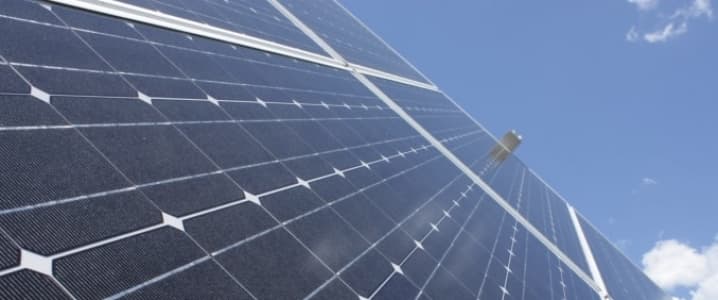The U.S. solar industry has surged in recent years, accounting for the largest source of new electric capacity in the past year, with plenty of room to grow. However, the Trump administration is weighing a trade tariff that could seriously curtail the explosive growth figures for U.S. solar.
On Tuesday, the U.S. International Trade Commission (ITC) recommended a 35 percent tariff on imported solar panels in response to a complaint from a U.S.-based solar manufacturer over cheap imported panels. The trade case has been cited by the solar industry as one of the most significant dangers to its otherwise bright future, labeling potential tariffs an “existential threat.” Many solar project developers use cheaper panels imported from places like China, and trade barriers could upend the economics of new solar projects.
But all is not lost. The 35 percent tariff proposed by the ITC is actually less than what Suniva Inc., the company lodging the complaint, had asked for. Suniva filed for bankruptcy earlier this year, blaming a wave of cheap imported panels for its demise. Suniva wanted tariffs on the order of 32 cents per watt, which is roughly equivalent to the full price for a panel on a per-watt basis. The proposed 35 percent tariff would translate into about 10 to 11 cents per watt, about a third of the 32 cents Suniva wanted.
As a result, the solar industry is breathing a sigh of relief, having potentially dodged a massive bullet. “That’s below the price that people have been hoarding panels for,” Jeffrey Osborne, an analyst at Cowen & Co., told Bloomberg. “On the demand side, jobs cuts won’t be as bad as feared, but on the manufacturing side, job creation won’t be as big. This would have a limited effect.”
Related: Are Higher Oil Prices Here To Stay?
But it’s not as if the tariffs would have no impact. Adding 10 to 11 cents per watt to the price of a solar panel would set the cost structure of developers back to about September 2016, erasing a year’s worth of gains, according to Bloomberg New Energy Finance (BNEF).
Still, solar developers believe it could have been much worse. “Nobody likes to pay more for their products,” said Nathan Serota of BNEF. “But it’s hard to see how much better of an outcome the industry reasonably could have asked for.” For its part, Suniva said the ITC’s recommendation didn’t go far enough, and “we’ll see very shortly the extinction of what remains of this manufacturing sector, and the jobs of American workers.”
The recommendation is still just a recommendation, and it will be sent to the desk of President Donald Trump, who faces a January deadline to decide what course of action to take. He doesn’t have to adhere to the recommendation and actually has a lot of leeway to come up with a solution. He could do nothing, stick with the recommendation, or go further.
There are some unexpected alliances forming over the tariff fight. Conservative groups, often hostile to renewable energy, have come to the defense of solar developers. Ten conservative, free-market groups wrote a joint letter to President Trump to oppose any tariffs on imported panels. "If trade restrictions are imposed, the cost of solar products in the United States could double, endangering tens of thousands of good-paying domestic jobs within the solar industry," the conservative groups wrote. The tariffs "would amount to nothing more than a crony capitalist giveaway to failing foreign-owned companies," the letter read. Also, Fox News host and key Trump ally Sean Hannity has railed against the proposed tariff, blaming foreign companies for trying to “manipulate U.S. trade laws” to get preferential treatment from the White House. Suniva’s majority owner is a Chinese company.
Related: Oil Prices Fly Higher On EIA Report
For solar installers, the hope is that the proposed tariff doesn’t take away the substantial momentum that was built up in recent years. In 2015 and 2016, for example, solar accounted for 30 percent and 39 percent of total installed electricity capacity, respectively. That is a larger market share than any other source of new electricity, including natural gas (which had a 29 percent share in both years).
Costs have plunged by roughly 75 percent in the past eight years, and will continue to fall, making solar one of the cheapest forms of electricity in the near future. The trade barriers under consideration by the Trump administration might be the only thing that could slow the industry down.
By Nick Cunningham for Oilprice.com
More Top Reads From Oilprice.com:
- U.S. Gasoline Demand Climbs To Record Highs
- Tensions Rise As Iraq Halts Kirkuk Oil Exports
- Trump’s China Trip To Reap Billions In Energy Deals


















